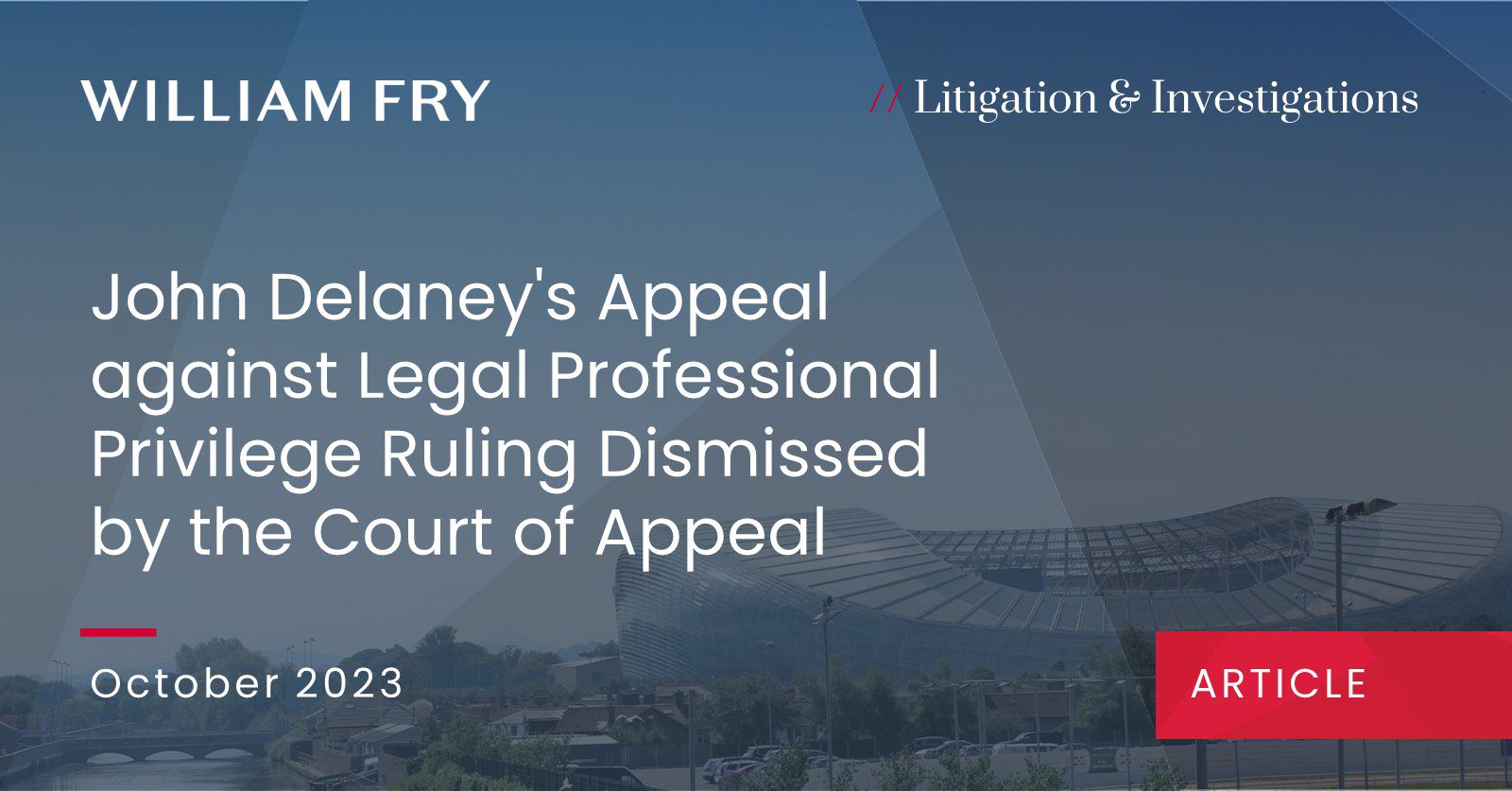In November 2022, the High Court (Court) held that Mr Delaney had failed to make out his claim that Legal Professional Privilege (LPP) applied to certain documents sought by the Corporate Enforcement Authority (CEA) in the context of an investigation into the affairs of the Football Association of Ireland (FAI) under Section 795 of the Companies Act 2014 (2014 Act).
The CEA seized documents from the offices of the FAI on foot of a search warrant and sought a determination from the Court as to whether certain documents attracted LPP. Two independent experts were appointed under Section 795(6)(b) of the 2014 Act to prepare a report (Assessors’ Report) to assist the court in reaching a conclusion. The Court ruled that Mr Delaney had failed to discharge the requisite burden of proof and ordered the disclosure of more than 1,000 documents to the CEA.
For more on this decision, see our previous article here and listen to the podcast prepared by our Sports and Entertainment Group here.
Issues on Appeal
Mr Delaney appealed the decision of the Court on several grounds. He argued that:
- the Court had disregarded the Assessors’ Report without giving any reason for doing so,
- if the Court was going to reject the Assessors’ Report, it was, at a minimum, obliged to examine the documents in question before reaching a conclusion as to their status,
- the Court had examined a sample of documents only, without identifying the documents examined or the reasons for concluding they were not privileged,
- the Court failed to correctly apply the appropriate legal principles,
- where there is a dispute as to whether LPP attaches to a document, the correct procedure is for the court to examine the document before reaching a conclusion.
The Assessors’ Report
The Court of Appeal (COA) noted that the purpose of the Assessors’ Report is to assist or facilitate the court in determining whether the information contained in a document is privileged. Ultimately, the question of whether a document attracts LPP is one for the court.
Mr Justice Noonan, delivering judgment for the COA, agreed that it was unsatisfactory that the Court had not given specific reasons for rejecting the Assessors’ Report. However, he held that, due to the unusual circumstances of the case, it was possible to infer those reasons with a sufficiently high degree of confidence. The Court had previously directed Mr Delaney to provide further information in respect of each document and how LPP applied in each case in an Order made on 22 October 2021 (Disclosure Order). The terms of the Disclosure Order made clear that the Court was not prepared to accept the conclusions of the Assessors’ Report at face value.
Is the court obliged to examine each document?
The COA rejected the suggestion that the Court had an obligation to consider each document individually before adjudicating on the privilege question. The court has the discretion to examine documents if it considers it necessary or advantageous to do so to enable it to reach a conclusion.
The COA found no issue with the decision of the Court to examine a sample of the disputed documents only. It held that the trial judge could have legitimately elected not to examine any of the documents, however, she chose to examine a sample to ascertain whether it was possible to reach a conclusion on privilege based on what the documents themselves contained. She concluded that this was not possible and there was nothing to be gained from reviewing all the documents. The COA held that the trial judge was entitled to arrive at this conclusion. Her decision not to review all 1,123 documents was well within the range of judgment calls available to a judge (especially considering her long familiarity with the case) and thus a significant margin of appreciation should be afforded.
Incorrect Application of Legal Principles?
Lastly, the COA rejected Mr Delaney’s contention that the Court, having identified the correct legal principles, applied them incorrectly. Mr Delaney failed to discharge the burden of proof to establish that LPP attached to the 1,123 documents. Insufficient evidence was adduced initially and Mr Delaney had then failed to comply with the Disclosure Order.
Conclusion
This case reiterates that the ultimate determination of whether a document attracts LPP rests with the court, which can exercise broad discretion in reaching its decision.
Contributed by Sarah Young



